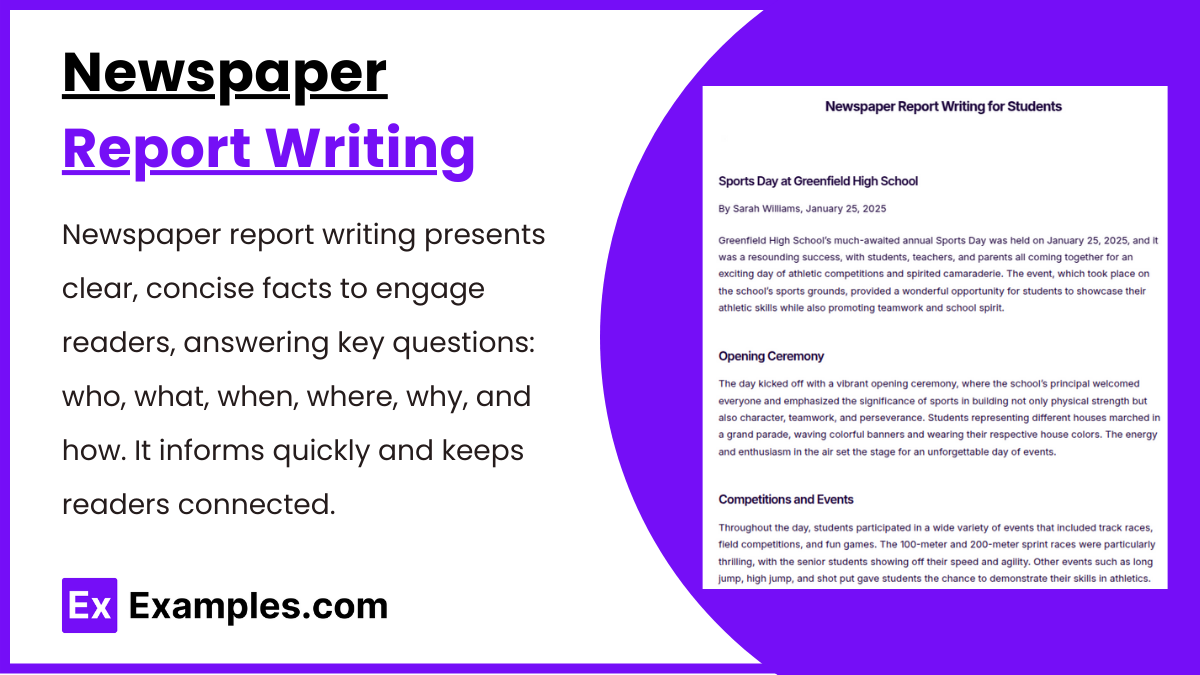10+ Newspaper Report Writing Examples to Download
Newspaper report writing is the art of presenting clear, concise, and factual information about events or issues in a way that grabs readers’ attention. A good newspaper report delivers accurate details while maintaining an engaging tone, often answering the essential questions: who, what, when, where, why, and how. This form of writing is structured to inform and educate the audience quickly, making it a key element in journalism. Whether covering local news, global events, or human-interest stories, effective newspaper report writing keeps readers informed and connected to the world around them. For those creating layouts or practicing journalistic writing, using professional newspaper templates can help ensure structure, clarity, and visual appeal.
What is Newspaper Report Writing?
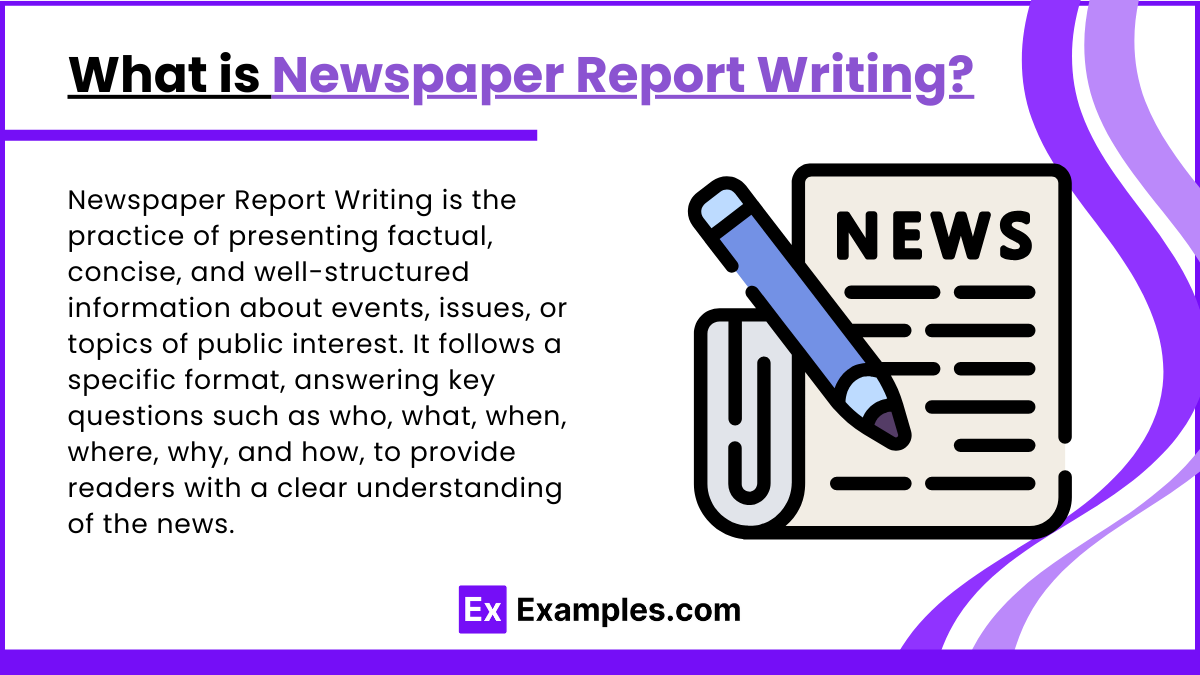
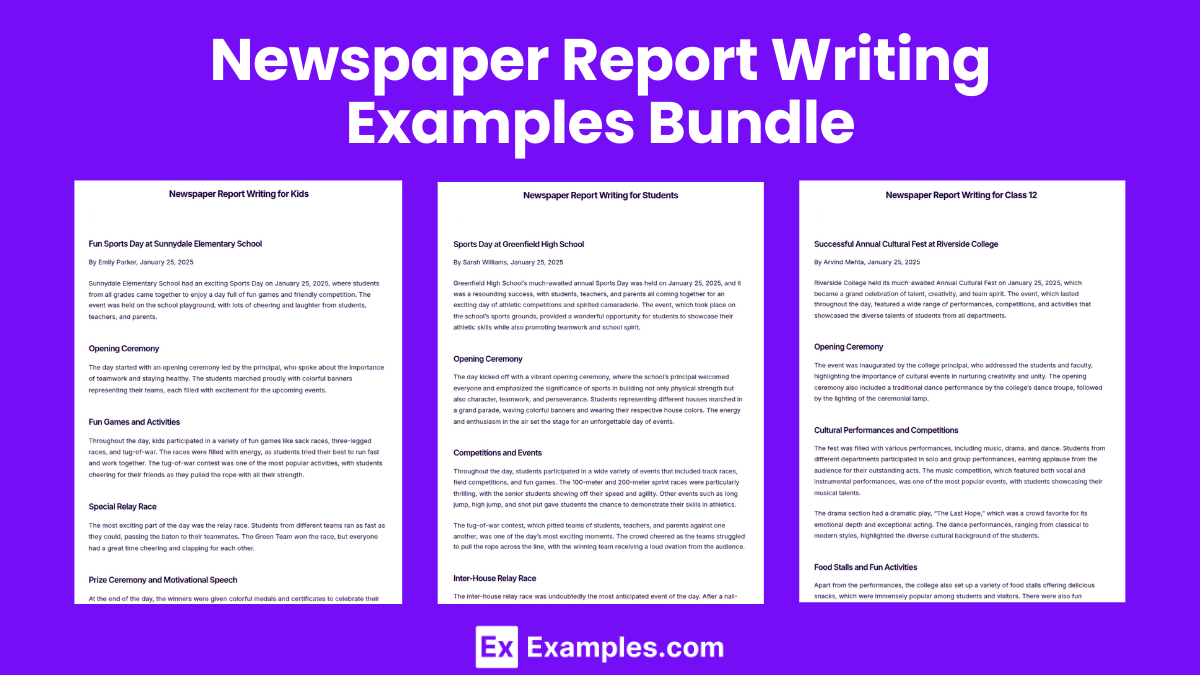
Newspaper Report Writing Examples Bundle
Newspaper Report Writing Format
Headline
A catchy and brief title that summarizes the essence of the report.
Byline
Includes the name of the reporter and the publication date.
Introduction
The opening paragraph answers the key questions: Who, What, When, Where, Why, and How. It provides a quick overview of the event or topic.
Body
This section contains detailed information about the event or issue. It is written in multiple paragraphs, presenting facts in a logical order. Quotes, statistics, and background details may be included for clarity.
Conclusion
The conclusion summarizes the main points and provides closure or additional insights into the topic.
Additional Information
Optional details such as a call to action, expert opinions, or further resources for the readers.
Newspaper Report Writing Example
Massive Fire Breaks Out at City Mall
By John Smith, January 26, 2025
A massive fire broke out at the City Mall last night, causing extensive damage to the property and injuring several individuals. The incident occurred around 9:30 PM, sending shockwaves through the local community.
According to eyewitnesses, the fire started on the ground floor near the food court and quickly spread to other sections of the mall. Over 200 people were inside the premises at the time of the fire, with many rushing to escape as smoke filled the building. Firefighters arrived promptly and worked tirelessly for nearly three hours to bring the flames under control.
Local authorities reported that ten individuals suffered minor injuries, with two requiring hospitalization. Investigations are underway to determine the exact cause of the fire, though initial reports suggest it might have been triggered by an electrical short circuit.
The City Mall management has assured the public that safety measures will be reviewed and improved to prevent such incidents in the future. Residents have expressed their concerns about the lack of fire alarms and emergency protocols, calling for stricter safety regulations in public spaces.
As the community recovers from this tragic event, efforts to rebuild and restore the mall are expected to begin soon.
Newspaper Report Writing Examples
Newspaper Report Writing for Students
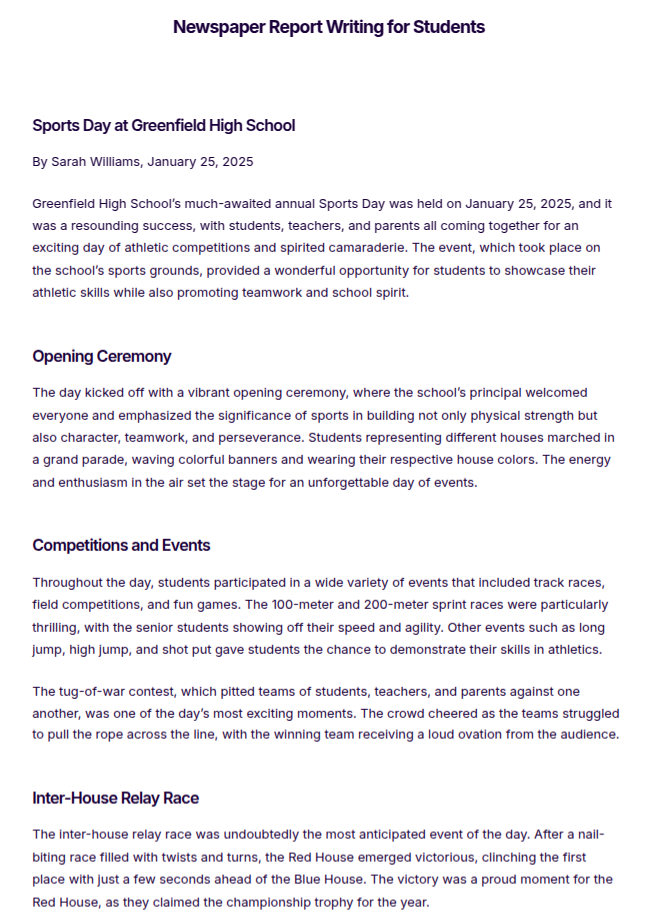
Newspaper Report Writing for Kids
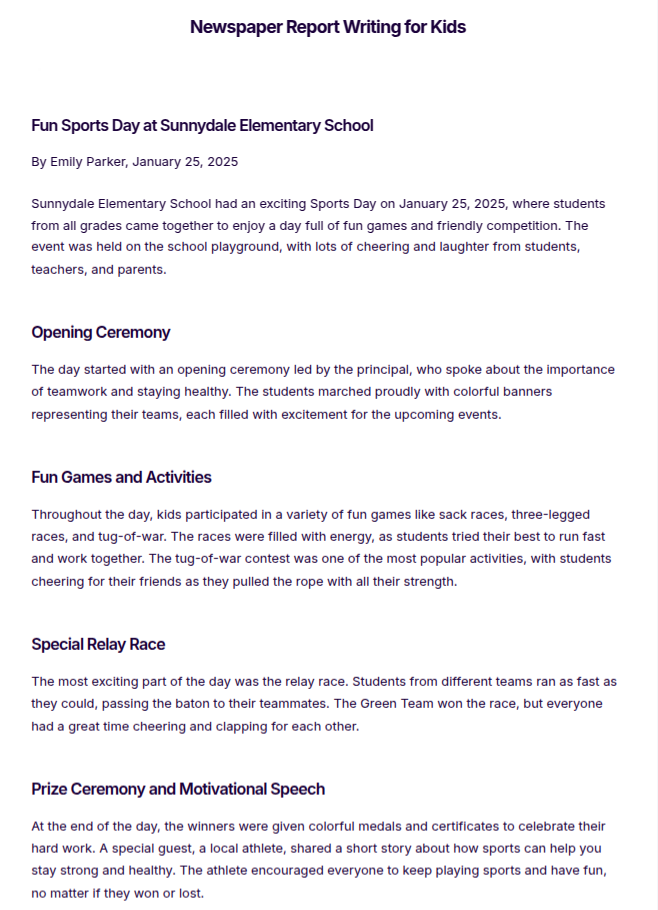
Newspaper Report Writing for Class 12
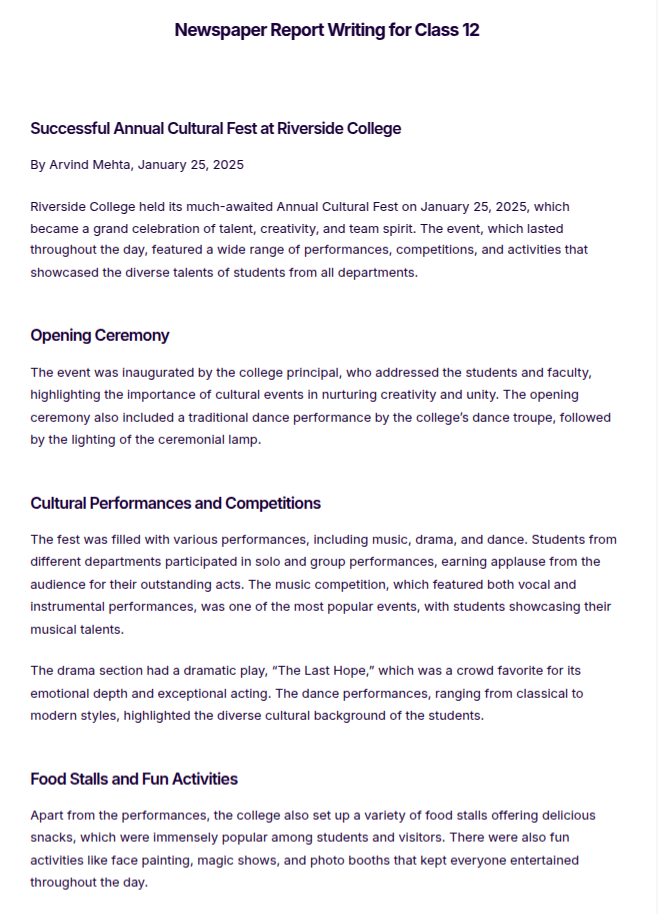
More Examples Newspaper Report Writing
- Igcse Newspaper Report Writing
- Newspaper Report Writing for Class 6
- Newspaper Report Writing for Class 7
- Newspaper Report Writing for Class 8
- Newspaper Report Writing for Class 9
- Newspaper Report Writing for Class 10
- Newspaper Report Writing on Road Accident
School Newspaper Report Writing Example
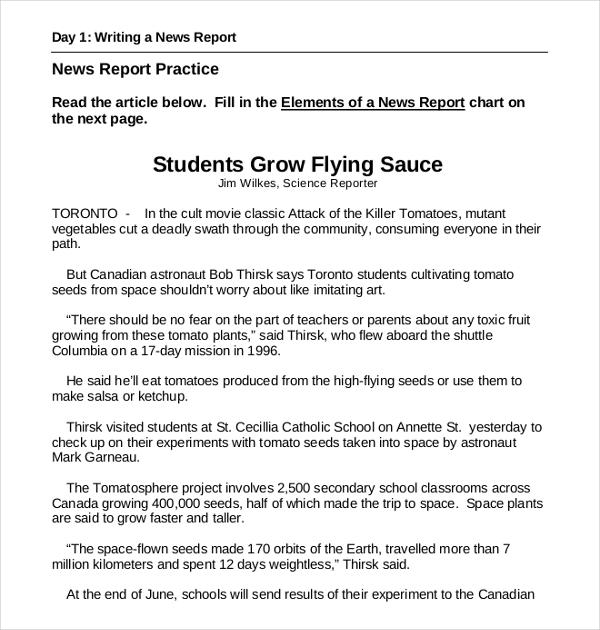
Types of Newspaper Report
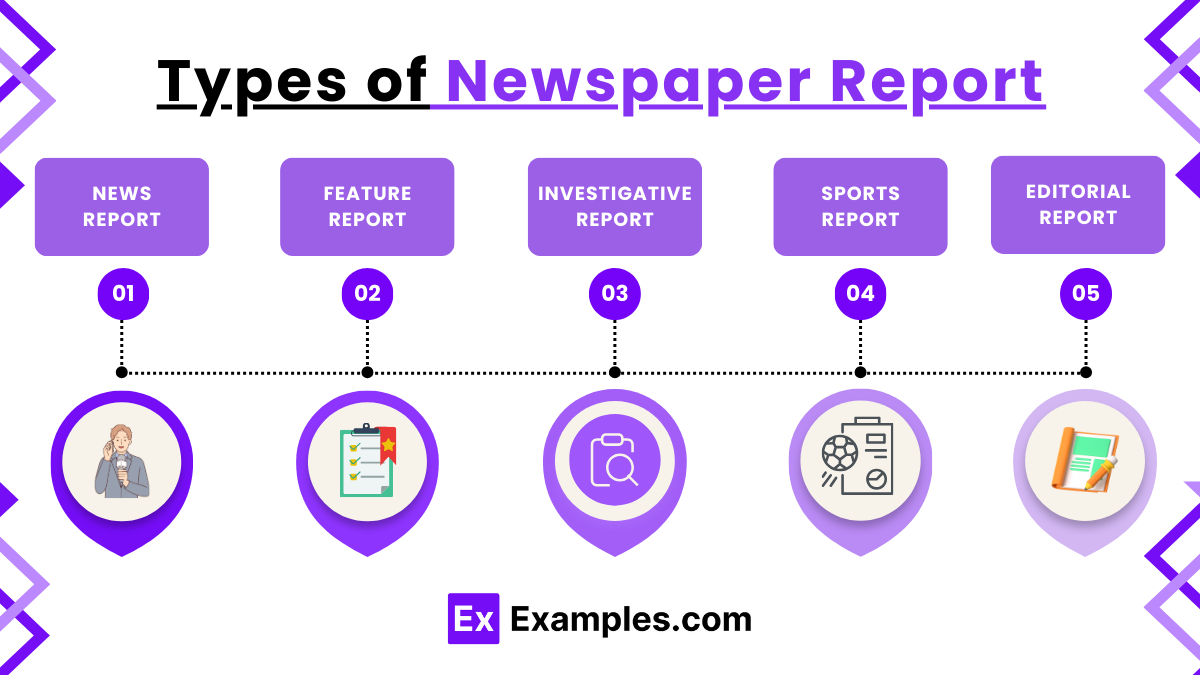
1. News Report
A news report provides factual, unbiased information about current events. It focuses on answering the basic questions: who, what, when, where, why, and how. News reports are concise and informative, meant to deliver quick updates on breaking stories.
2. Feature Report
A feature report is more in-depth and provides detailed background information on a topic. It often explores human interest stories or focuses on unique aspects of a subject, providing a comprehensive view and emotional connection with the readers.
3. Investigative Report
An investigative report involves in-depth research and analysis to uncover hidden facts or expose wrongdoing. Journalists working on investigative reports typically conduct interviews, analyze documents, and dig deeper into complex issues, often leading to new revelations or reforms.
4. Sports Report
A sports report covers the latest results, updates, and performances in the sports world. These reports provide information on games, tournaments, and competitions, often including player and team analyses, scores, and statistics.
5. Editorial Report
An editorial report represents the opinion of the newspaper or its editorial team on various issues. Unlike objective news reports, editorials focus on offering analysis, viewpoints, and arguments related to current events or societal matters, influencing public opinion.
How to Write a Newspaper Report
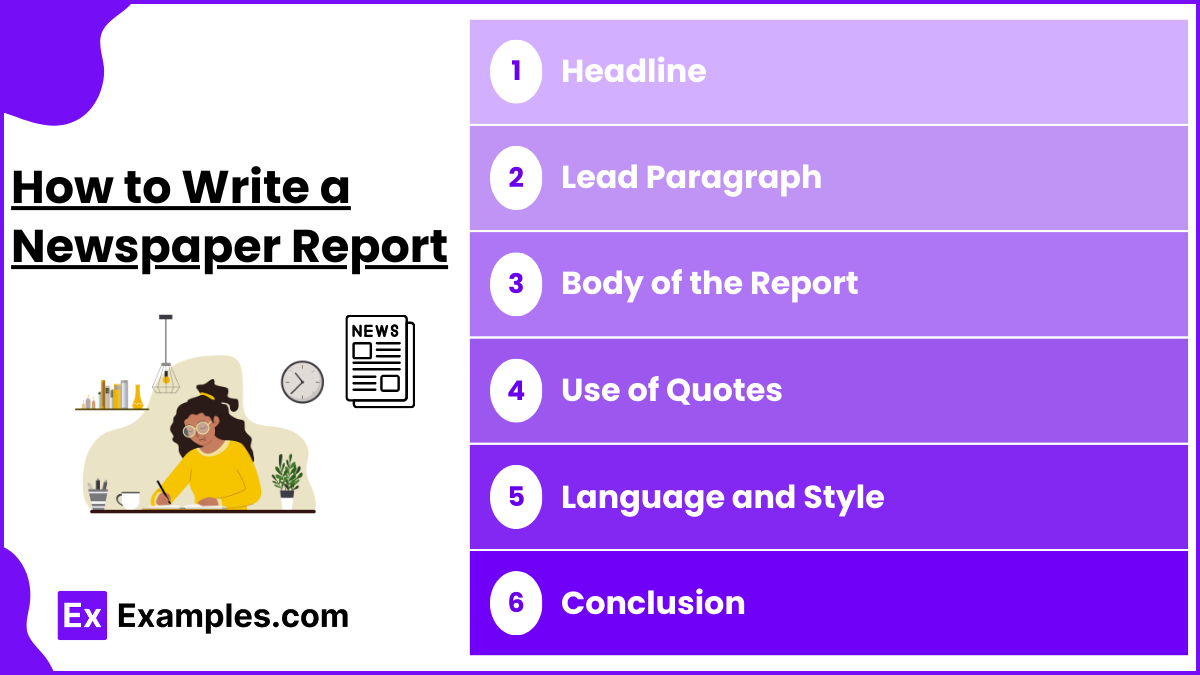
- Headline: Write a catchy and clear headline that summarizes the main point of the report.
- Lead Paragraph: Start with the most important details, including the who, what, when, where, why, and how. Make it concise and engaging.
- Body of the Report: Provide more detailed information, including background context, additional facts, and quotes from witnesses or experts. Organize it logically.
- Use of Quotes: Include quotes from people involved or knowledgeable about the event to add credibility and a personal touch to the report.
- Language and Style: Keep the language simple, clear, and objective. Avoid unnecessary jargon and be sure to write in the third person.
- Conclusion: End with a strong conclusion, summarizing the key points or stating any follow-up actions, such as upcoming events or future developments.
Tips for Writing Newspaper Report
- Start with a Strong Lead: Catch the reader’s attention and include the most important details at the beginning.
- Focus on Facts: Present accurate and verified information, avoiding personal opinions or biases.
- Use Clear Language: Write in a straightforward manner, ensuring the report is easy to read and understand.
- Include Relevant Quotes: Add authenticity by incorporating statements from witnesses, experts, or officials.
- Maintain a Logical Flow: Organize the information in a clear sequence, from the most critical details to the supporting facts.
FAQs
Why is accuracy important in newspaper reporting?
Accuracy ensures reliability and credibility of the newspaper, helping to maintain public trust and inform readers without spreading misinformation.
What is the difference between a newspaper report and an article?
A newspaper report provides factual, straightforward news coverage, while an article might include opinions, interpretations, or broader discussions of a topic.
How can one improve their newspaper reporting skills?
Improve by practicing clear and concise writing, verifying all facts, understanding the audience, and continually seeking feedback on your reports.
What are the 5 Ws of the newspaper report?
The 5 Ws in a newspaper report are: Who (the people involved), What (the event or action that occurred), When (the time or date), Where (the location), and Why (the reason or cause).
What should a newspaper report look like?
A newspaper report should have a clear and concise headline, a byline with the reporter’s name, a lead paragraph summarizing the main facts, followed by a detailed body that elaborates on the 5 Ws, and a logical conclusion. It should be factual and free from personal bias.


